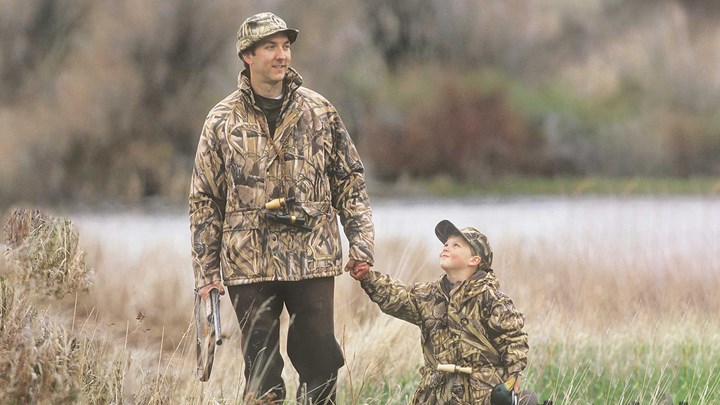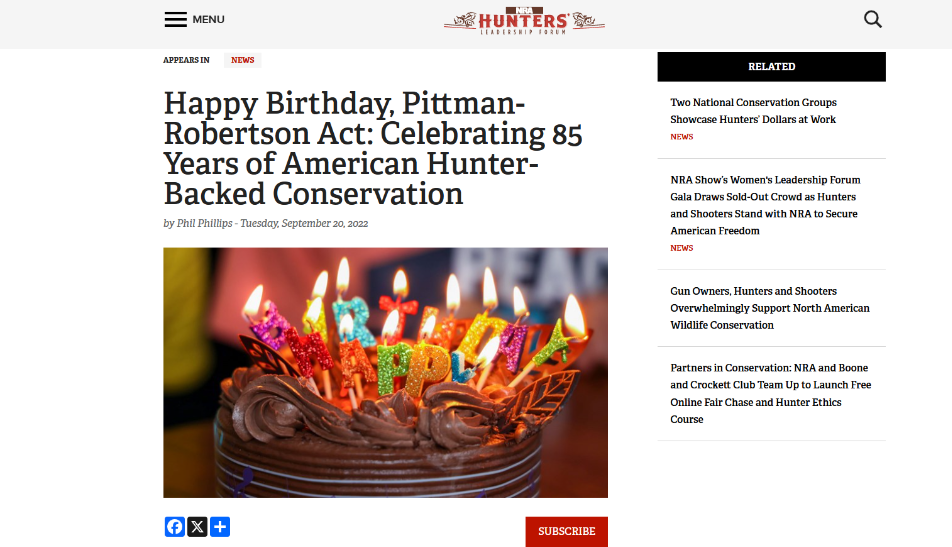
by Mark Chesnut - Friday, July 19, 2024

Over the past several years, new hunters have been joining our ranks in droves, and there’s no doubt we’re proud to have them on board. There’s strength in numbers, and with various organizations constantly battling to end the lifestyle we love, increased hunter numbers is an important factor in the ongoing debate.
If you’re a new hunter, we welcome you to what is not only a time-honored tradition, but an important way of life to many of us. And welcome also to the world of conservation since you, as a hunter, are now partially responsible for funding the bulk of wildlife management in our country.
That fact might surprise you, so let me explain. Through license fees and federal excise taxes paid on guns and some other hunting equipment, you are helping fund the greatest wildlife conservation system on earth—the North American Model of Wildlife Conservation.
Wildlife in the United States and Canada is managed differently than in most other countries. Among other things, this model holds that wildlife resources—from game birds to small game to large game animals—are held in trust for all citizens. That basically means you and I own the wildlife. And while the model respects private land owners, the wildlife on those lands are owned by all Americans.
The fees you pay for hunting licenses, tags and permits, along with taxes paid on sporting equipment, fund wildlife conservation in this country. And while anti-hunting groups like to say they are involved in wildlife conservation, in reality they don’t contribute much to actual wildlife management.
Let’s take a quick look at how you, as a new hunter, are now doing your part for wildlife management and conservation.
Licenses, Tags and Stamps
When you bought your first hunting license, you might have looked at it as an inconvenience. In reality, you were funding wildlife conservation and hunting programs through your state wildlife conservation agency.

Agencies rely on hunting license, tag and stamp fees to fund not only the agency, but most of the projects it undergoes on behalf of hunters. Typically, the only other funds received by the agency comes from a federal tax that we’ll discuss later.
Whether buying a hunting license, upland game tag or state waterfowl stamp, you, the hunter, are providing the much-needed funds for your state agency to survive and thrive. Make no mistake: Without hunter dollars in the form of licenses and tags, most state wildlife agencies would be drastically hamstringed and unable to undertake the important conservation projects that directly affect you and all hunters.
So, when you go to a license dealer or get online to purchase a hunting license or tag, don’t look at it as an inconvenience or an unnecessary expense. You’re helping nourish your own sport, and that’s an admirable thing.
Federal Excise Taxes
Last year marked the 85th anniversary of the Federal Aid in Wildlife Restoration Act,
commonly called the Pittman-Robertson (P-R) Act. Back in 1937, many wildlife species, including many game species, were on the brink of being wiped from existence. Hunters and conservationists were clamoring for a way to stop the drastic decline.
With much thought, Congress, with the blessing of hunters and those in the firearm industry, passed the Pittman-Robertson Act. That law places an excise tax at the manufacturer level, which is passed on to consumers, on guns, ammunition and various other pieces of archery gear.
Monies from the tax are apportioned to the states for various wildlife projects—both for game and nongame animals—based on the number of licensed hunters in the state. State wildlife agencies make their own management decisions about how the funds are used, and the P-R dollars typically fund up to 75 percent of project costs. Most states must provide a matching share of up to 25 percent, usually from state hunting license revenues.
Consequently, if you just became a hunter, your state game agency will now receive a little bit more of those tax dollars. Since the implementation of this program, more than $10 billion has been distributed to state fish and wildlife agencies, making hunters and shooters the largest direct contributors to wildlife conservation in our nation’s history.
Wrapping It Up
In the end, congratulations are in order. Not only have you found a grand new pastime that provides hours of enjoyment, appreciation for nature and healthy, lean protein to feed your family, but you’re also doing your part to fund the future of wildlife and hunting. And that’s something we can all be proud of.
About the Author
Freelance writer and editor Mark Chesnut is the owner/editorial director at Red Setter Communications LLC in Jenks, Okla. An avid hunter, shooter and field-trialer, he has been covering Second Amendment issues and politics on a near-daily basis for nearly 25 years.
E-mail your comments/questions about this site to:
[email protected]
Proudly supported by The NRA Foundation and Friends of NRA fundraising.
